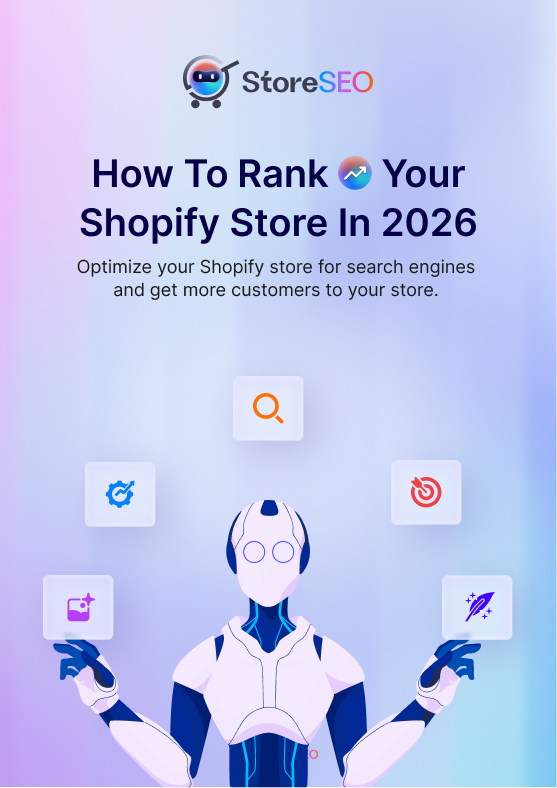L'intelligenza artificiale (IA) sta cambiando il modo in cui operano i negozi online. Non è più solo un'idea fantascientifica; è uno strumento reale che aiuta le aziende a vendere di più, lavorare in modo più intelligente e rendere felici i clienti. Dai suggerimenti sui prodotti alla prevenzione delle frodi, l'IA sta diventando un elemento chiave dell'e-commerce. In questo blog, esploreremo più di dieci modi in cui l'IA viene utilizzata nello shopping online. Manterremo le informazioni semplici, coinvolgenti e facili da capire, così potrete vedere come l'IA sta plasmando il futuro dell'e-commerce.

1. Raccomandazioni di prodotti personalizzate
La personalizzazione basata sull'intelligenza artificiale è come avere un personal shopper che ti capisce davvero, rendendo lo shopping più fluido e aiutando al contempo i negozi nel mondo digitale. Vediamo come: navighi in un negozio online e, all'improvviso, il sito ti suggerisce articoli che sembrano scelti apposta per te. È così che funziona l'intelligenza artificiale nell'e-commerce. Ti aiuta ad analizzare i tuoi acquisti passati, la cronologia delle ricerche e persino quanto a lungo ti soffermi su determinati prodotti per prevedere cosa potresti apprezzare in seguito.
Utilizza algoritmi intelligenti come il filtro collaborativo per abbinarti ad acquirenti simili o il filtro basato sui contenuti per concentrarsi sugli articoli che più si adattano ai tuoi gusti. Questo non è solo un vantaggio per gli acquirenti: aiuta le aziende ad aumentare le vendite, migliorare l'esperienza complessiva e persino ridurre i fastidiosi abbandoni del carrello, stimolandoti con componenti aggiuntivi o promemoria pertinenti.
2. Ricerca intelligente e acquisto vocale

Hai mai digitato qualcosa di vago in una barra di ricerca e hai comunque trovato quello che cercavi? Questa è l'intelligenza artificiale al lavoro. Motori di ricerca basati sull'intelligenza artificiale Capire cosa intendono i clienti, anche se le loro parole non sono esatte. Ad esempio, se cerchi "abito rosso per festa", l'IA può mostrarti gli abiti adatti all'occasione. Lo shopping vocale è un altro utilizzo interessante. Con assistenti AI come Alexa o Google Assistant, i clienti possono dire "Trovami una giacca nera" e l'IA cercherà le opzioni nel negozio. Questo rende lo shopping più veloce e comodo.
3. Prezzi dinamici
Stabilire il prezzo dei prodotti è complicato. Se si fissano prezzi troppo alti, i clienti se ne vanno; se si fissano prezzi troppo bassi, l'azienda perde denaro. L'intelligenza artificiale risolve questo problema regolando i prezzi in tempo reale in base alla domanda, alla concorrenza e al comportamento dei clienti. Ad esempio, se un giocattolo popolare si vende velocemente, l'intelligenza artificiale potrebbe aumentarne leggermente il prezzo. Nei periodi di ribasso, può abbassare i prezzi per attrarre acquirenti. Questa strategia aiuta le aziende a rimanere competitive e a massimizzare i profitti senza deludere i clienti.
4. Gestione dell'inventario
Esaurire le scorte o avere un inventario eccessivo può danneggiare un'azienda. L'intelligenza artificiale aiuta prevedendo quali prodotti saranno venduti e quando. Esamina le vendite passate, le tendenze e persino le festività per prevedere la domanda. Ad esempio, se l'intelligenza artificiale nota che la crema solare si vende di più in estate, può suggerire al negozio di fare scorta in primavera. Questo riduce gli sprechi e garantisce che i prodotti siano disponibili quando i clienti li desiderano. È come avere un pianificatore di magazzino super intelligente.
5. Chatbot per il servizio clienti
Il servizio clienti può fare la differenza per un negozio online. I chatbot basati sull'intelligenza artificiale sono disponibili 24 ore su 24, 7 giorni su 7, per rispondere a domande, risolvere problemi e guidare gli acquirenti. Se qualcuno chiede "Dov'è il mio ordine?", il chatbot può verificarne lo stato e rispondere immediatamente. Questi bot utilizzano l'elaborazione del linguaggio naturale per comprendere e rispondere come gli esseri umani. Fanno risparmiare tempo alle aziende e forniscono risposte rapide ai clienti, migliorando la soddisfazione.
6. Rilevamento e prevenzione delle frodi
Lo shopping online è fantastico, ma comporta rischi come le frodi. L'intelligenza artificiale è eccellente nell'individuare attività sospette. Può analizzare migliaia di transazioni in pochi secondi per individuare schemi che suggeriscono frodi, come acquisti insoliti o ordini multipli da un unico account. Ad esempio, se qualcuno cerca di acquistare 50 laptop con una carta di credito rubata, l'intelligenza artificiale può segnalarlo e bloccare l'ordine. Questo protegge sia l'azienda che i clienti onesti.
7. Analisi del sentiment del cliente
Capire cosa pensano i clienti è fondamentale per il successo. L'intelligenza artificiale può analizzare recensioni, post sui social media e feedback per capire cosa pensano i clienti di un negozio o di un prodotto. Ad esempio, se molti clienti si lamentano di spedizioni lente, l'intelligenza artificiale può avvisare l'azienda affinché risolva il problema. Può anche individuare tendenze positive, come ad esempio quali prodotti ricevono i maggiori elogi. Questo aiuta i negozi a migliorare i propri servizi e a concentrarsi su ciò che i clienti apprezzano.
8. Marketing personalizzato

Inviare la stessa email a tutti i clienti non è molto efficace. L'intelligenza artificiale rende il marketing personale Creando messaggi personalizzati. Ad esempio, se un cliente acquista spesso prodotti per animali domestici, l'IA può inviargli un'offerta speciale sul cibo per cani. Può anche decidere il momento migliore per inviare le email in base al momento in cui è più probabile che i clienti le aprano. Questo rende il marketing più pertinente e aumenta le probabilità che i clienti clicchino e acquistino.
9. Ricerca visiva
A volte, i clienti vedono qualcosa che gli piace ma non sanno come descriverlo. Basato sull'intelligenza artificiale ricerca visiva Permette loro di caricare un'immagine e trovare prodotti simili. Ad esempio, se qualcuno vede una lampada in una foto e ne desidera una simile, può caricare l'immagine e l'IA cercherà nel negozio gli articoli corrispondenti. Questo vale soprattutto per la moda e l'arredamento, dove l'aspetto conta tanto quanto la funzionalità.
10. Previsione della fidelizzazione e dell'abbandono dei clienti
Fidelizzare i clienti è importante quanto trovarne di nuovi. L'intelligenza artificiale può prevedere quali clienti potrebbero smettere di fare acquisti in un negozio analizzandone il comportamento. Ad esempio, se qualcuno non acquista nulla da mesi, l'intelligenza artificiale potrebbe segnalarlo come "a rischio" di abbandono. Il negozio può quindi inviare uno sconto speciale o un messaggio amichevole per convincerlo a tornare. Questo approccio proattivo aiuta le aziende a fidelizzare i clienti.
11. Ottimizzazione della catena di fornitura
Portare i prodotti dalle fabbriche ai clienti richiede molti passaggi. L'intelligenza artificiale semplifica questo processo prevedendo i ritardi, individuando i percorsi di spedizione migliori e riducendo i costi. Ad esempio, in caso di tempesta in arrivo, l'intelligenza artificiale può suggerire un percorso di consegna diverso per evitare ritardi. Può anche aiutare a scegliere i fornitori in base a prezzo e affidabilità. Questo garantisce che i prodotti arrivino puntuali e mantiene bassi i costi.
12. Prove virtuali e realtà aumentata
Provare vestiti o vedere come stanno i mobili in una stanza è difficile online. L'intelligenza artificiale, abbinata alla realtà aumentata (AR), risolve questo problema. I clienti possono usare la fotocamera del telefono per "provare" abiti o vedere come si adatta un divano al loro soggiorno. Ad esempio, un marchio di cosmetici potrebbe consentire ai clienti di testare virtualmente le tonalità del rossetto. Questo rende lo shopping più divertente e riduce i resi perché i clienti sanno cosa stanno acquistando.
13. Creazione di contenuti per elenchi di prodotti
Scrivere descrizioni di prodotti Per migliaia di articoli, la ricerca richiede molto tempo. L'intelligenza artificiale può generare descrizioni chiare e accattivanti in pochi secondi. Può anche creare titoli, tag e parole chiave per aiutare i prodotti a comparire nei risultati di ricerca. Ad esempio, per un maglione blu, l'intelligenza artificiale potrebbe scrivere: "Maglione blu in cotone, perfetto per le serate fresche". Questo fa risparmiare tempo e garantisce che gli annunci siano ottimizzati per i motori di ricerca.
14. Analisi predittiva per le tendenze
Sapere cosa vorranno i clienti in futuro è un superpotere. L'intelligenza artificiale analizza i dati provenienti dai social media, dalle ricerche e dalle vendite per individuare tempestivamente le tendenze. Ad esempio, se nota che più persone cercano abbigliamento sostenibile, può suggerire di offrire prodotti eco-compatibili. Questo aiuta le aziende a rimanere all'avanguardia e a offrire ciò che i clienti desiderano prima ancora che lo chiedano.
15. Automazione dell'evasione degli ordini
Imballaggio e spedizione rapidi degli ordini sono fondamentali. L'intelligenza artificiale può semplificare questo processo organizzando gli ordini, scegliendo l'imballaggio migliore e assegnando compiti ai robot nei magazzini. Ad esempio, in un magazzino di grandi dimensioni, l'intelligenza artificiale può indicare ai robot quali articoli prelevare e come imballarli in modo efficiente. Questo velocizza le consegne e riduce l'errore umano, rendendo i clienti soddisfatti.
16. Supporto multilingue

I negozi online spesso servono clienti provenienti da paesi diversi. L'intelligenza artificiale può tradurre descrizioni di prodotti, chat del servizio clienti e recensioni in più lingueAd esempio, se un cliente francese visita un negozio negli Stati Uniti, l'IA può mostrare il sito web in francese. Può anche gestire le domande dei clienti in diverse lingue, rendendo lo shopping accessibile a tutti.
17. Gestione dei resi
I resi rappresentano una grande sfida nell'e-commerce. L'intelligenza artificiale può prevedere quali prodotti saranno probabilmente restituiti in base ai dati passati. Ad esempio, se una certa taglia di scarpe viene restituita spesso, l'intelligenza artificiale può suggerire di offrire guide alle taglie più efficaci. Può anche semplificare la procedura di reso guidando i clienti attraverso i passaggi o suggerendo cambi anziché rimborsi. Questo consente di risparmiare denaro e di mantenere i clienti soddisfatti.
18. Generazione di blog AI
Creare contenuti accattivanti, come i blog, è essenziale per attrarre clienti su un sito di e-commerce. Agenti di intelligenza artificiale Può scrivere blog su argomenti come guide ai prodotti, tendenze di settore o consigli per lo shopping. Ad esempio, un negozio di abbigliamento online potrebbe utilizzare l'intelligenza artificiale per generare un blog intitolato "Le 10 migliori tendenze della moda estiva" per attirare lettori. L'intelligenza artificiale garantisce che i contenuti siano chiari, ottimizzati per i motori di ricerca e in linea con il tono del brand. Questo fa risparmiare tempo ai responsabili del marketing e contribuisce ad aumentare il traffico verso il negozio.
Una trasformazione più efficiente e impressionante nel settore dell'e-commerce
L'intelligenza artificiale sta trasformando l'e-commerce in modi che rendono lo shopping migliore per tutti. Dal suggerimento del prodotto perfetto alla creazione di contenuti coinvolgenti per i blog, l'intelligenza artificiale aiuta le aziende a risparmiare tempo, ridurre i costi e fidelizzare i clienti. Non si tratta di sostituire gli esseri umani, ma di rendere il loro lavoro più semplice ed efficace. Con l'evoluzione dell'intelligenza artificiale, possiamo aspettarci utilizzi ancora più entusiasmanti nello shopping online. Che gestiate un piccolo negozio o un marketplace gigante, l'intelligenza artificiale è uno strumento che può aiutarvi ad avere successo. Il futuro dell'e-commerce è qui, ed è alimentato dall'intelligenza artificiale.
Se hai bisogno di aiuto con StoreSEO, sentiti libero di contatta il nostro team di supportoE per aggiornamenti e notizie più entusiasmanti, iscriviti ai nostri blog. Buona fortuna!










